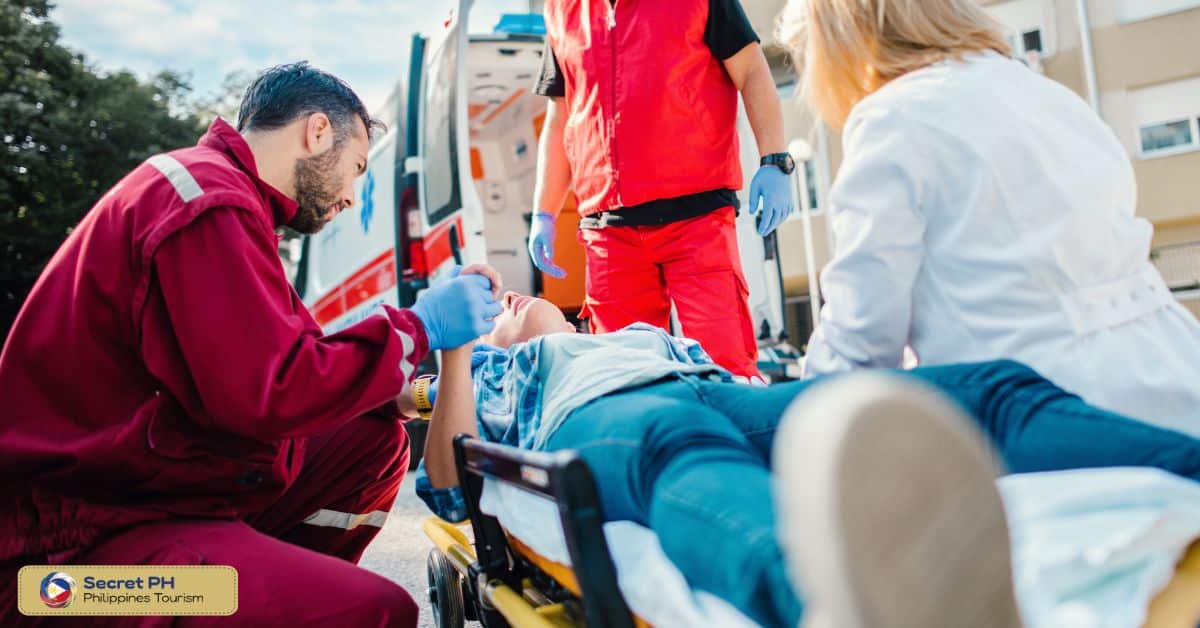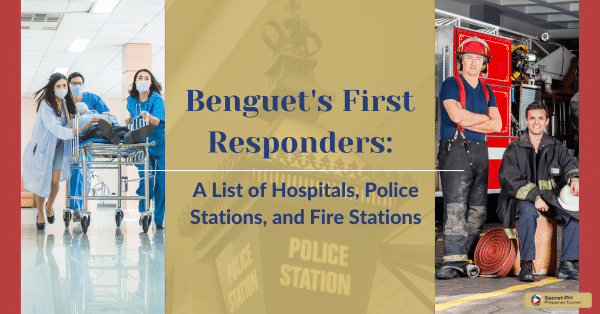Philippines Emergency Services play a vital role in supporting mental health during crisis situations. They offer psychological first aid, counseling, and referrals to specialized mental health services to individuals and families affected by disasters, conflicts, and emergencies. Their interventions aim to mitigate the impact of traumatic experiences and promote resilience and recovery among those affected.
Through various programs and initiatives, emergency services in the Philippines are supporting mental health in crisis situations. In this blog, we’ll take a closer look at the efforts being made to address the mental health needs of disaster survivors in the country.

Mental Health in the Philippines
Mental health is a pressing concern in the Philippines. With a population of over 100 million people, there is a high demand for mental health services. These are often not met due to insufficient resources. The World Health Organization estimates that one in five Filipinos experience a mental health condition. This ranges from depression to schizophrenia. This has led to increasing awareness about mental health.
The government implementing new policies and initiatives to address this issue. Despite these efforts, stigma remains a major barrier to seeking help. It leaves many struggling with their conditions in silence. It is important to continue to raise awareness and provide accessible mental health resources. This helps improve the lives of those affected by mental health conditions in the Philippines.

Mental Health and Emergency Services
Mental health crises can often be unpredictable and require immediate attention from emergency services. Police officers, paramedics, and even firefighters are trained to respond to these crises. They offer support to those in need. The situation can often be exacerbated by a lack of understanding or stigma surrounding mental health. It is important to understand that mental health emergencies are just as urgent as physical emergencies. Every individuals in crisis should receive the same level of care and attention.
Importance of mental health in crisis situations
In times of crisis, mental health should not be overlooked. Emergency situations can be challenging and overwhelming, causing significant stress and anxiety. Therefore, taking care of our mental well-being is crucial to cope with such situations. Mental health and emergency services work hand in hand. The trained professionals provides psychological support to those in need. They not only offer immediate assistance but also follow-up care.
This is to help individuals recover from the traumatic incident. Recognizing the importance of mental health in crisis situations ensures that first responders and victims receive the proper support they need during these challenging times. Prioritizing mental well-being during emergencies can help individuals and communities bounce back and recover from the impact of a crisis.

Mental health challenges in the Philippines
Mental health challenges in the Philippines pose a significant issue for its citizens. With limited resources and services available, individuals battling mental health illnesses struggle to receive the proper care and attention needed. Emergency services, in particular, are insufficient, creating a situation where those in urgent need of help are often left to fend for themselves.
This reality emphasizes the need for greater awareness and investment in the country’s mental health care system. Without a doubt, addressing these issues requires a collective effort from both the government and private sectors, which can collaboratively work towards providing accessible and inclusive mental health services for all.

Mental health support in emergency services
Emergency services require mental health support just as much as they require physical equipment. First responders often face critical incidents that can leave profound psychological impacts on them, ranging from post-traumatic stress disorder (PTSD) to depression. Fortunately, there has been a growing recognition of mental health support in the emergency services sector. Organizations and agencies are providing training and resources to equip emergency responders with the necessary knowledge to deal with stress and trauma.
Additionally, the introduction of Employee Assistance Programs (EAPs) by emergency services has made it easier for first responders to access mental health support. EAPs provide confidential counseling services to employees and their families, as well as training on topics such as stress management. These initiatives are crucial in addressing the well-being of our emergency services personnel, who play an integral role in keeping our communities safe.

Types of Emergency Services in the Philippines
When an emergency situation arises, knowing who to call and what kind of help you need is crucial. In the Philippines, emergency services are available 24/7 to provide assistance and save lives. These services can range from medical assistance to fire response and law enforcement. The local government also has their own set of emergency services tailored to the specific needs of their respective communities. With the help of these organizations, Filipinos can rest assured that there is always someone ready to provide aid in times of crisis.
Police and Law enforcement
Police and law enforcement play a crucial role in ensuring public safety and maintaining peace and order in the Philippines. There are various types of emergency services that fall under this category, including the Philippine National Police, the Bureau of Fire Protection, and the Bureau of Jail Management and Penology. Each of these organizations has a specific mandate and works together to provide swift and effective assistance during emergency situations.

Fire and Rescue
Fire and rescue services in the Philippines include a range of emergency response teams equipped to handle fires and other critical situations. These teams may include firefighters and paramedics, who work together to rapidly respond to emergencies and provide lifesaving support. From traditional fire trucks to aerial ladders, rescue boats and helicopters, these teams are equipped with the latest equipment and technology to meet the challenges of any situation.

Medical emergency services
In the Philippines, medical emergency services are classified into three types: Basic Life Support or BLS, Advanced Life Support or ALS, and Specialized Medical Care Transport or SMCT. BLS includes first aid, vital signs monitoring, and cardiopulmonary resuscitation. ALS offers more advanced care such as medication administration and airway management. Meanwhile, SMCT is for patients who require more specialized medical care while en route to the hospital.

Emergency management services
Emergency management services in the Philippines comprise various types of services that work together to respond to disasters and emergencies. These services include fire and rescue, medical response, search and rescue, and disaster management. Each type of service has its own set of professionals, equipment, and protocols to ensure a coordinated and efficient response to emergencies. High-quality emergency management services are crucial in the Philippines, which is prone to natural disasters such as typhoons, earthquakes, and floods.

Mental Health Support in Emergency Services in the Philippines
Mental health support in emergency services is a crucial aspect that is often overlooked. The pressure of working in high-stress situations takes a significant toll on the mental well-being of emergency responders. In the Philippines, mental health and wellness programs for emergency service providers are crucial to ensuring that they remain healthy and productive.
These individuals are required to maintain clear thinking and emotional stability even in the most difficult situations. Organizations providing these services should prioritize the well-being of their staff by developing programs that address their mental health.
Training and education of emergency service personnel
In the Philippines, mental health is becoming an increasingly important issue in emergency services, and as a result, training and education of emergency service personnel in this area is crucial. The demanding nature of emergency services work can often take a toll on mental health, resulting in burnout, PTSD, and other mental health issues.
The need for trained professionals who can address these challenges has never been greater in the Philippines. The key is to provide emergency service personnel with the knowledge and tools they need to recognize and manage mental health concerns effectively.

Partnership with mental health organizations
Partnering with mental health organizations is an important step toward improving mental health support in emergency services in the Philippines. These partnerships allow for greater understanding and knowledge sharing between emergency responders and mental health professionals which ultimately leads to better care for those in need.
With these joint efforts, emergency responders can better recognize and manage mental health events that may arise during emergencies, while mental health professionals can provide crucial support and resources to both responders and impacted individuals. In addition to improving care, partnerships like this also help reduce the stigma around mental health, ultimately leading to a more compassionate and inclusive society.

Implementation of mental health support programs
The implementation of mental health support programs for emergency services in the Philippines is a significant step towards addressing the mental health needs of those who serve as first responders. The nature of their work exposes them to high levels of stress, trauma, and emotional burnout. These programs aim to provide preventive and responsive interventions to mitigate the impact of psychological distress on the well-being of emergency service workers.
By providing crucial support and resources for mental health and wellness, these programs enable first responders to maintain their resilience and continue to provide effective service to their communities.

In Conclusion
The Philippines emergency services have taken a great leap in supporting mental health during crisis situations. With the rise of natural disasters and other emergencies across the country, the mental well-being of the populace has taken a backseat. However, the government has addressed the issue by training their emergency responders to be more equipped in handling the psychological tolls of such situations.
This move has proved to be critical as mental health issues can arise from traumatic incidents. Thus, the Philippines is gradually becoming a model when it comes to providing a comprehensive emergency response that caters to both the physical well-being and emotional needs of its people. It is a commendable effort that deserves recognition, and other countries can learn a thing or two from the Philippines’ approach.







